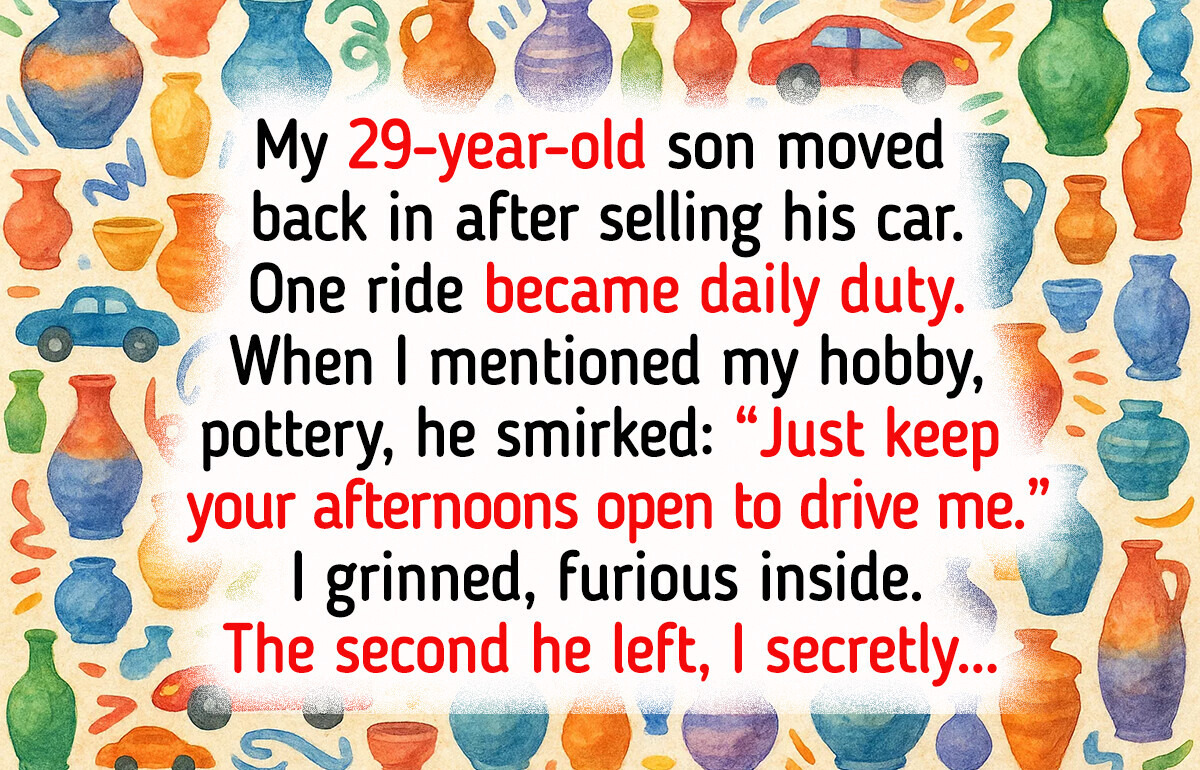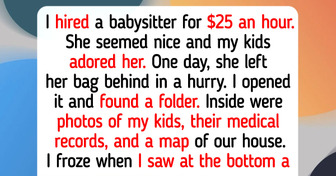Give him a timeline to move out. And if he's still there you're going to evict him. And do it, show him the filled out paperwork. And stop doing anything for him. No rides, laundry, cooking, dishes. Nothing.
My Son Thought I’d Be His Free Driver—But I Refused to Waste My Retirement

Having an adult child move back home can be both comforting and challenging. You want to help them through their struggles, but sometimes the support you offer turns into expectations you never agreed to. Our reader, Lucy, went through something like that when her 29-year-old son moved in, and the situation quickly got out of hand.
Here is Lucy’s story:
My 29 y.o. son Carl moved in during a rough patch. He’d sold his car, so I gave him a ride once. Soon it became every day.
When I said I’d spend afternoons on pottery, he laughed: “Just be free to pick me up.” I smiled, fuming inside.
At first, I told myself it was no big deal. I wanted to support him while he figured things out. But over the weeks, it stopped feeling like a favor and started feeling like a job. If I hesitated or said I had something else planned, he’d sigh or roll his eyes, like I was inconveniencing him.
It wasn’t just the rides. He started leaving his laundry for me to “help with” and piling dishes in the sink because he was “too busy.” I began to feel like I had another teenager in the house, not a grown man.
The moment he laughed about my pottery was the breaking point. That hobby has been my escape for years. It’s quiet, it’s mine, and I’ve dreamed of turning it into something bigger. For him to dismiss it so easily made me realize he didn’t see me as a person with my own life, just as his backup plan.
As soon as he left that day, I did something bold. I booked a week-long intensive pottery program in another city — solo. I didn’t even tell him until the day before.
Then, while he was out, I converted the garage into a small pottery studio. Some of his boxes were stacked there, so I moved them into the guest room for now.
When he came home and saw the changes, he froze. He stared at the garage, then at me, and finally at his stuff piled in the corner. He asked, “So, you just decided this without me?” I told him yes, because it was my house and my garage, and I needed a space for myself.
He didn’t take it well. He said I was being selfish and that I’d embarrassed him because now he’d have to ask coworkers for rides. That’s when it hit me: he wasn’t upset about the garage or the studio, he was upset about losing the convenience of having me at his service.
Here’s the twist — a few days later, when I came back from my pottery program, I found he had moved some of his boxes back into the garage, pushing aside my shelves. He claimed he needed “storage space.” It felt like a silent protest, a way of undoing what I’d done.
That’s when I told him directly: this wasn’t temporary anymore. The studio was staying, and I wasn’t going to keep being his driver. If he wanted to live with me, he had to treat me with respect, or he’d need to find another place.
He looked stunned, like he couldn’t believe I’d actually stood my ground.
Lucy
Thank you for sharing your story with us, Lucy. Having your grown son move back in and treat you like his personal driver can’t be easy. You opened your home and gave him support, which is a big thing.
But now it seems like your own time and passion are being dismissed, as if his needs should always come first. That’s a really unfair position for you to be in.
Here are some steps you can take now:
Have a clear talk about house rules: Let him know what you’re willing to help with and what you’re not. For example, say directly: “I can’t be your daily driver. You’ll need to sort out your own transportation.”
Encourage independence: Suggest practical solutions he can look into, like public transit, carpooling with people, or saving up for a cheap used car. It shifts responsibility back to him.
Protect your space: The garage is your studio now. Make it clear that moving his boxes back in isn’t an option. If he needs storage, he can rent a small unit or keep it neatly in the guest room.
Set a timeline: Living with you should be temporary. Ask him what his goals are for work, savings, or moving out, and agree on a reasonable timeline so you don’t end up in limbo.
Stay consistent: He may push back or get upset, but the more consistent you are, the faster he’ll adjust. Boundaries only work when you hold to them.
Living with your adult son might be challenging, especially when the lines between support and dependence get blurry. But moments like these remind us that setting boundaries can be just as important as offering love.
Comments
Good for you. I agree he needs a timeline to move out or he needs to contribute to the household chores and money for expenses. He should be doing your laundry lol.
Related Reads
I Refuse to Let My Mom Sabotage Me Again — My Mother-in-Law Finally Protected Me

10 Honest Stories That Capture the Struggles and Pain of Blended Families

12 Stories That Capture the Sweet and Sour Memories of Blended Families

I Refused to Talk to My Parents After They Chose My Ex-Wife Over Me

I Refused to Pay for Our Valentine’s Dinner—Then I Learned the Heartbreaking Truth

I Gave Up My 2-Month-Old Baby for Adoption Because I Chose My Own Happiness

14 Stories From Cleaners That Are Wilder Than Any Movie Script

My Family Excluded My Girlfriend From Christmas Because We’re Not Married

12 Small Acts of Kindness That Quietly Changed Lives

17 Moments That Remind Us Kindness Is a Choice, Not a Mood

I Forbade My Stepdaughter From Eating Meat — My House, My Rules

My Boss Publicly Shamed My Small Charity Donation—So I Revealed Exactly How Much He Gave




